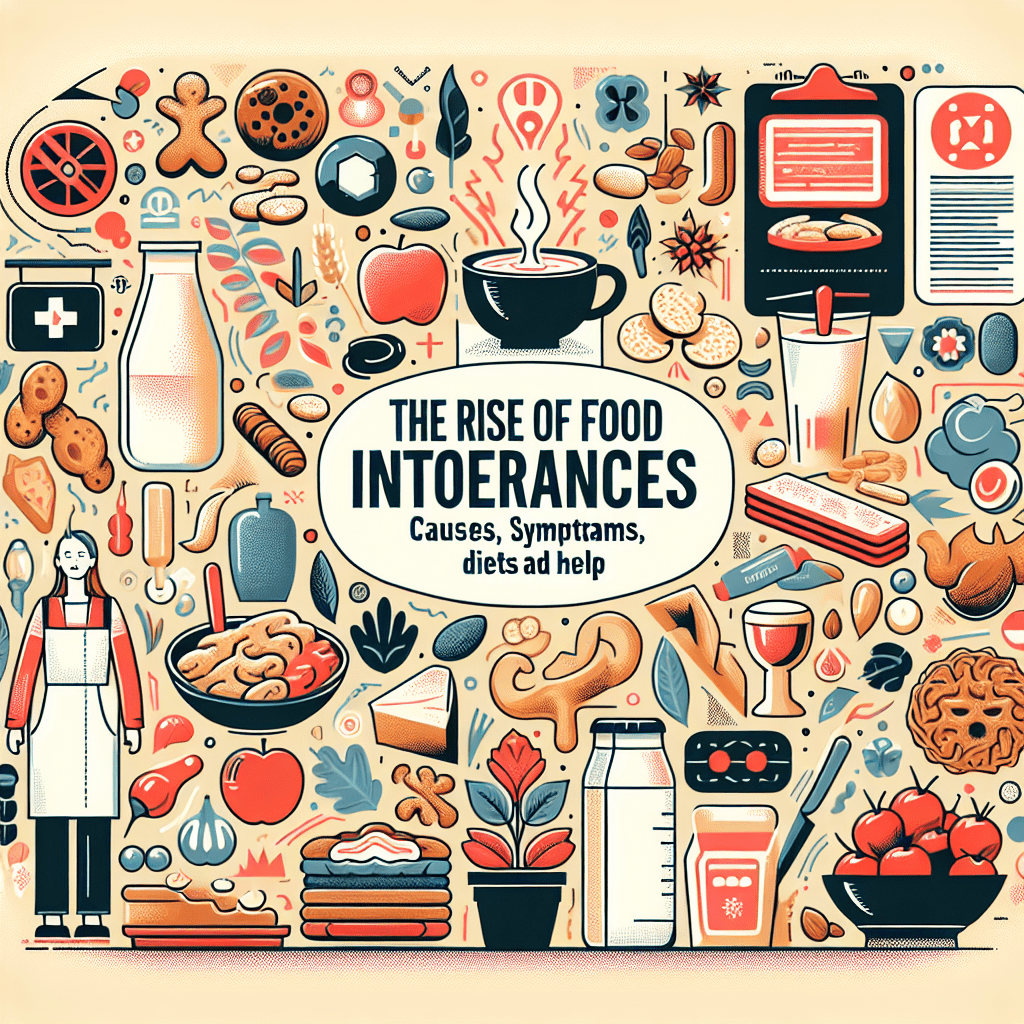[ad_1]
### The Rise of Food Intolerances: Causes, Symptoms, and Diets That Help
In recent years, there has been a noticeable increase in the prevalence of food intolerances across the globe. This rise can be attributed to a number of factors, ranging from changes in food production and processing to the modern lifestyle. Unlike food allergies, which trigger the immune system, food intolerances mainly affect the digestive system and can cause a range of uncomfortable symptoms. Understanding the causes, recognizing symptoms, and knowing which diets can help manage these intolerances are key steps toward improving quality of life for those affected.
#### Causes of Food Intolerances
1. **Enzyme Deficiencies**: The lack of specific enzymes needed to digest certain components of food is a common cause. For instance, lactose intolerance results from a deficiency in lactase, the enzyme required to break down lactose found in dairy products.
2. **Chemical Sensitivities**: Some people are sensitive to naturally occurring chemicals in foods, such as histamines in aged cheeses and cured meats, or to additives like sulfites and MSG, leading to intolerances.
3. **Irritable Bowel Syndrome (IBS)**: Individuals with IBS often find that certain foods exacerbate their symptoms due to the sensitivity of their intestines.
4. **Celiac Disease**: While it’s an autoimmune disorder rather than an intolerance, celiac disease requires those affected to avoid gluten to prevent harm to their small intestine, thus overlapping with gluten intolerance.
5. **Genetic Factors**: There’s evidence suggesting that genetics play a role in predisposing individuals to certain food intolerances.
6. **Food Processing and GMOs**: The way foods are processed, preserved, or genetically modified can sometimes make them harder to digest or trigger intolerances.
#### Symptoms of Food Intolerances
The symptoms can range from mild to severe and often manifest hours to days after consuming the offending food. They include:
– Bloating and gas
– Diarrhea or constipation
– Stomach cramps
– Headaches or migraines
– Fatigue
– Skin rashes and conditions like eczema
– Nausea
Recognizing these symptoms as part of a pattern after eating particular foods is crucial in identifying a food intolerance.
#### Diets That Help
Dietary management is the cornerstone of dealing with food intolerances. Here are some effective diets:
1. **Elimination Diet**: This involves removing suspected foods from the diet until symptoms improve, then gradually reintroducing them to pinpoint the culprits.
2. **Low-FODMAP Diet**: Designed primarily for individuals with IBS, this diet involves restricting foods high in fermentable oligosaccharides, disaccharides, monosaccharides, and polyols, which are difficult for some to digest.
3. **Lactose-Free Diet**: Avoiding dairy or choosing lactose-free alternatives can help those with lactose intolerance.
4. **Gluten-Free Diet**: Necessary for people with celiac disease or non-celiac gluten sensitivity, this diet requires avoiding wheat, barley, rye, and their derivatives.
5. **Histamine-Restricted Diet**: Reducing the intake of high-histamine foods can help individuals with histamine intolerance manage their symptoms.
It’s important to approach dietary changes with the guidance of a healthcare professional or a dietitian to ensure nutritional needs are met.
#### FAQs
**Q**: How do I know if I have a food intolerance?
**A**: If you suspect a food intolerance, note your symptoms and the foods you eat. Seek advice from a healthcare provider who may recommend an elimination diet or testing.
**Q**: Can food intolerances go away?
**A**: Some intolerances, like lactose intolerance, can be managed but not cured. Others might improve over time with proper dietary management.
**Q**: Are food intolerances the same as food allergies?
**A**: No, food intolerances mainly affect the digestive system and are generally less severe than allergies, which involve the immune system and can be life-threatening.
**Q**: Is there a cure for food intolerances?
**A**: While there’s no cure, managing your diet and avoiding trigger foods can effectively control symptoms.
**Q**: Can food intolerances affect children?
**A**: Yes, children can develop food intolerances, often presenting with symptoms like stomach pain, diarrhea, or rashes. It’s important to consult with a pediatrician if food intolerance is suspected in a child.
### Conclusion
The rise in food intolerances has become a significant health concern, affecting the wellbeing of many. Understanding the causes and symptoms is the first step toward addressing these issues. Through strategic diet adjustments and professional guidance, individuals can manage their intolerances effectively, leading to improved health outcomes and quality of life. Navigating the complexities of food intolerances might be challenging, but with the right approach, it is possible to enjoy a diverse and nutritious diet while minimizing discomfort and adverse reactions.
[ad_2]

Leave a Reply